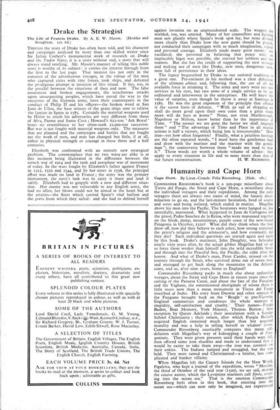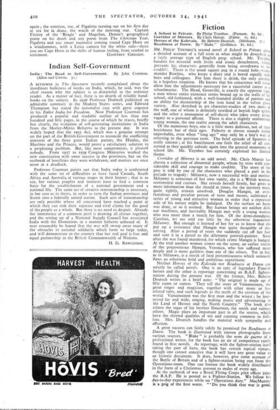Humanity and Cape Horn
Cape Horn. By Lieut.-Comdr. Felix Riesenberg. (Hale. 18s.)
COMMANDER RIESENBERG'S book is a 500-page miscellany about Tierra del Fuego, the Strait and Cape Horn, a miscellany about the individual voyagers and their expeditions. Among the early voyagers there are always two states of mind, the fanatic deter- mination to go on, and the last-minute hesitation, bred of scurvy and sores and being isolated, which ended in mutiny. Magellan drove his men into the Pacific. The hesitators were hanged or, less mercifully, marooned.. What happened to Juan de Cartagena and the priest, Pedro Sanchez de la Reins, who were marooned together on the bleak, damp, mountainous, purple coast of the new-found Patagonia in October, 152o? What did they think when the boat drew off, how did they behave to each other, how strong remained the priest's religion and the aristocrat's, and how eventually did they die? Such individual questions are started again and again by this book. Drake's mutineer, John Doughty, was beheaded nearly sixty years after, by the actual gibbet Magellan had set up to force those weaker than himself into the wild incredible Strait and through into the Peaceful Sea, the Pacific, the calm after the horror. And what of Drake's man, Peter Carder, missed on the journey through the Strait, who survived alone out of seven men, and managed to get back along the mountains to the Atlantic coast, and so, after nine years, home to England?
Commander Riesenberg packs in much else about unfamiliar voyages, about the Strait and Cape Horn in recent years since the cutting of the Panama Canal, and about the fate of the Fuegians and the Yaghans, the exterminated aboriginals of whom there is little more now than a mean monument in Tierra del Fuego inscribed a/ Indio. His story from Darwin and other sources of the Fuegians brought back on the ' Beagle' to pre-Victorian England summarises and condenses the whole mixture of stupidity, self-satisfaction and cruelty." Their names--Fuegia Basket, Boat Memory, York Minster, Thomas Button ; their reception by Queen Adelaide ; their inoculation with a Sunday School Christianity ; their return, after which Fuegia Basket's acquired English remained much longer than her acquired morality and was a help in selling herself to whalers' crews. Commander Riesenberg caustically compares this mean self- delusion with Magellan's way of kidnapping a couple of Pata- gonians. They were given presents until their hands were full, then offered some iron shackles and made to understand that it would be easier to take them away—the iron was coveted—°n their ankles. The Indians hinted and struggled, but the iron held. They were tamed and Christianised—a briefer, less com- plicated and franker villainy. When Magellan left the Canary Islands for the New World, Pigafetta, who kept a journal of the expedition, wrote "Monday, the third of October of the said year (152o), we set sail, making the course auster, which the Levantine mariners call Siroc, enter- ing into the ocean sea." Thai is the emotion Commander Riesenberg fedi often in this book, that entering .into the ocean sea—which can now only be imagined, not experienced again ; the emotion, too, of Pigafetta turning out on his first day at sea for la diane, the watch of the morning star. Captain Fitzroy of the ' Beagle ' and Magellan, Donne's geographical poem on his death and any poem from The Christian Year, Pigafetta and any smart journalist coming round Cape Horn on a windjammer, with a Leica camera for the white sails—there you see Cape Horn in the shifts of human feeling, from symbol to



























 Previous page
Previous page